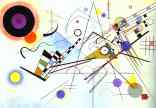Lecture on Postmodernism
Of course, there’s a little more to it than that, but Modernism in a nutshell is all about the attempt to find the foundation or underlying truth.
Nowadays, however, we live in a postmodern society. Postmodernism is almost the next logical step to follow Modernism. In short, Postmodernism critiques the critics and claims that you can’t come up with universal theories to explain the world.
Some more definitions:
Some guy named Lyotard, whose name immediately makes me think of this,
 ,
,
argued “that Modern philosophies legitimized their truth claims not on logical and empirical grounds, but rather on the grounds of accepted stories (metanarratives) about knowledge and the world. In our postmodern condition, these metanarratives no longer work to legitimize truth claims.”
Postmodernists are “skeptical of binary oppositions [. . .] such as the expectation that the philosopher may cleanly isolate knowledge from ignorance.”
Postmodernism is “an openness to meaning and authority from unexpected places, so that the ultimate source of authority is the ‘play’ of the discourse itself.”
Following this at all? Freud’s got some interesting theories, but he had an abusive father (maybe) and he did a lot of coke, so, you know, those things might have gotten in the way of his uncovering the underlying truth.
Postmodernism takes Modernism one step further. It’s like, “okay, that’s not a pipe, I get it, but then what about this:”

Is it a triangle?
This might prompt you to say “whoa!” like Keanu Reeves as Neo in The Matrix. If so, you might be on to something. This French guy, Jean Baudrillard, wrote a book called Simulacra and Simulation, which is one of the first books attempting to theorize the postmodern condition. He’s close to impossible to understand, but in the first chapter of his book, he references a story by Jorge Luis Borges in which some cartographers draw up a map of an Empire. The map is so detailed, it “ends up covering the territory exactly.” As the Empire declines, the map begins to fray and fall apart, except in the deserts, where it remains visible.
The story is a metaphor for our society nowadays. Our current culture presents a representation of real life that is more real to us than what it’s representing. Does that make sense to you? It’s like when people who spend a lot of time online begin typing “teh” to mean “the,” or “pwns” to mean “owns.” The typos become the word.
The distinction between reality and the representation is so blurred that we’re essentially living in the representation (the map). Think about it: this is what The Matrix is all about. Everyone is literally living in a virtual reality. But is The Matrix descriptive of our lives? Aren’t we all in some sense plugged into media, into consumer society, into just being fuel for a greater system?
Think of how many people wouldn’t eat chicken if they had to actually watch the animal being killed. They’re removed from the reality of what eating meat means.
Think about how many people go around quoting from their favorite movies or TV shows all the time.
Think about how many people believe there was a link between Saddam and Osama.
Think about video games. Or that online game called Second Life.
In The Matrix, when Morpheus is explaining the matrix to Neo, he shows him the real world and says, “Welcome to the desert of the real.” This is a direct reference to Baudrillard, who claimed that our current world is like Borges’ fable except that we’re living on the map and the actual territory is rotting away — with a few exceptions in the deserts.
All sorts of interesting philosophical issues emerge from postmodern theory:



